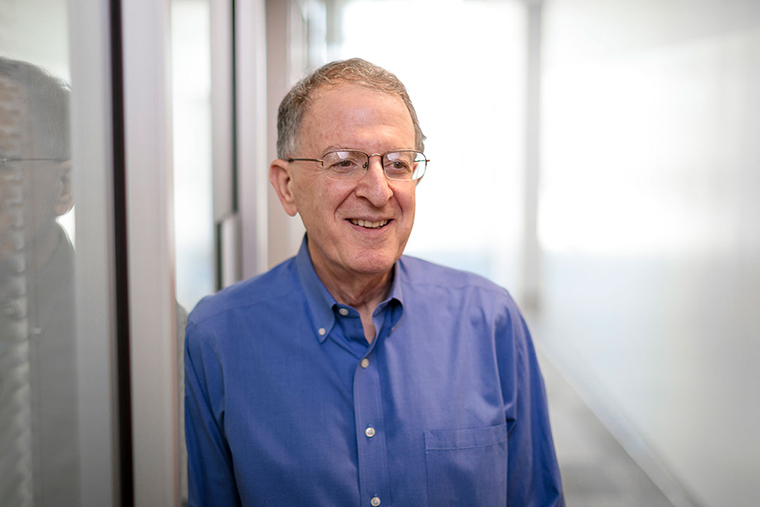
Jeffrey I. Gordon, MD, the Dr. Robert J. Glaser Distinguished University Professor at Washington University School of Medicine in St. Louis, has been awarded the 21st annual Nierenberg Prize from the Scripps Institution of Oceanography at the University of California, San Diego. The prize is awarded for outstanding contributions to science in the public interest.
Gordon, director of the Edison Family Center for Genome Sciences & Systems Biology at WashU Medicine, is credited with founding the field of gut microbiome research. His transformative studies have demonstrated that human health and disease are shaped by the communities of microbes that live in the human gut. His body of work has opened up the vast new therapeutic potential for the microbiome, exemplified by his identification of ways to repair the gut microbiomes of children with malnutrition and restore their healthy growth.
"The public is becoming increasingly aware of the microbiome," Gordon said. "As such, there is a need to mindfully deal with the body of evidence emerging from bench-to-bedside translation that culminates with carefully designed, rigorously performed, well-controlled clinical trials. Specifically, we need to engage in a discussion about the ethical, regulatory and other societal issues raised by the results of this research. Microbiome research is helping us understand the impact of Westernization, the origins of our health disparities as well as the existential threat posed by climate change."
The Nierenberg Prize has been awarded to a diverse list of recipients whose work has had an indelible impact on science in the public interest. Past honorees include primatologist Jane Goodall, Intel founder Gordon Moore, evolutionary biologist E.O. Wilson, climate scientist James Hansen, nature filmmaker David Attenborough, news anchor Walter Cronkite, Academy Award-winning filmmaker James Cameron, CRISPR-Cas9 co-discoverer Jennifer Doudna, and, most recently, Katalin Kariko, who also was honored with the Nobel Prize in Physiology or Medicine for her contributions to the development of mRNA vaccines for COVID-19. The Nierenberg Prize honors the memory of William A. Nierenberg, who led Scripps for more than 20 years.
As part of the award, Gordon will deliver a public lecture Oct. 11 at UC San Diego.
"The gut microbiome has emerged as a key mediator of human health, and we hope our studies are helping to reveal new and better strategies to treat childhood malnutrition in ways that are sustainable and widely accessible," Gordon said. "I'm honored to have worked with so many dedicated and talented colleagues, students and trainees over the years who have made important contributions to the public's understanding of the gut microbiome."
A staggering 3 million children die from malnutrition annually, and many more continue to suffer long-term problems with growth and development. While traditional therapeutic foods reduce deaths from malnutrition, such foods do not address the long-standing problems associated with the condition, including impaired immunity, slower brain development and reduced bone and muscle growth.
Together with his collaborators at the International Centre for Diarrhoeal Disease Research in Bangladesh (icddr,b), Gordon has led the development of treatments for malnutrition that repair the dysfunctional microbiomes of affected children in ways that benefit the many organ systems and physiologic functions required for restoration of healthy growth. His team's new approaches have identified the key naturally occurring biomolecules in their "microbiome-directed" therapeutic foods, characterized how these biomolecules are processed by growth-promoting members of the gut microbial community, and revealed how these members operate to improve physiologic functions inside and outside of the gut.
Major international clinical trials are underway to further evaluate the generalizability and durability of the effects of Gordon's innovative microbiome-directed therapeutic food in children of different ages living in different countries where the burden of disease is great. The trials - funded by the Bill & Melinda Gates Foundation and carried out in collaboration with the World Health Organization (WHO) and the United Nations Children's Fund (UNICEF) - involve nearly 20,000 children in Bangladesh, India, Pakistan, Mali, Tanzania and Niger.
Gordon is a member of the National Academy of Medicine, the National Academy of Sciences, the American Academy of Arts & Sciences, and the American Philosophical Society. He has served as the research mentor to 147 doctoral and MD/PhD students and postdoctoral fellows since he established his lab at Washington University. Many of these individuals have become leaders in the field of human microbiome research.
His long-standing collaboration with Bangladeshi colleagues at icddr,b is widely viewed as a model for how such relationships, involving an academic lab in a high income country and an institution in a low-income country, can and should be constructed to ensure sustained mutual benefit, scientific progress and societal impact.
Gordon has received many awards recognizing his extraordinary contributions to science and medicine, including the Albany Medical Center Prize in Medicine and Biomedical Research, the Dr. Paul Janssen Award for Biomedical Research, Spain's Princess of Asturias Award for Technical and Scientific Research, the Balzan Prize, the British Royal Society's Copley Medal, the Louisa Gross Horwitz Prize and the Keio Medical Science Prize.
About Washington University School of Medicine
WashU Medicine is a global leader in academic medicine, including biomedical research, patient care and educational programs with 2,900 faculty. Its National Institutes of Health (NIH) research funding portfolio is the second largest among U.S. medical schools and has grown 56% in the last seven years. Together with institutional investment, WashU Medicine commits well over $1 billion annually to basic and clinical research innovation and training. Its faculty practice is consistently within the top five in the country, with more than 1,900 faculty physicians practicing at 130 locations and who are also the medical staffs of Barnes-Jewish and St. Louis Children's hospitals of BJC HealthCare. WashU Medicine has a storied history in MD/PhD training, recently dedicated $100 million to scholarships and curriculum renewal for its medical students, and is home to top-notch training programs in every medical subspecialty as well as physical therapy, occupational therapy, and audiology and communications sciences.
Originally published on the School of Medicine website






